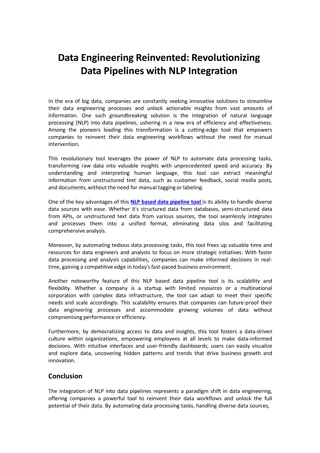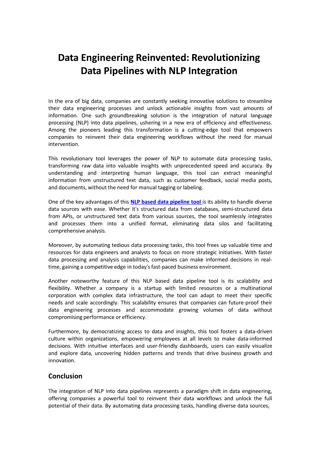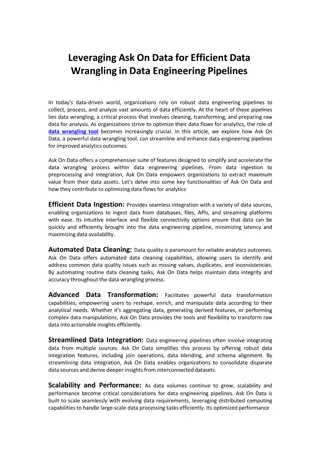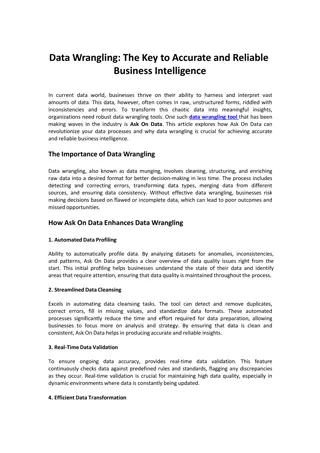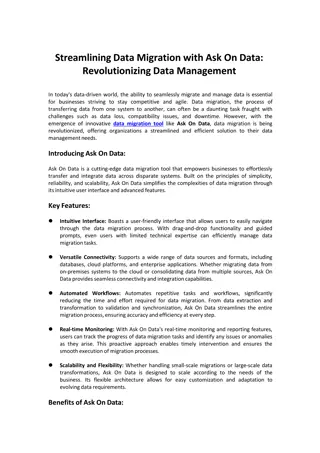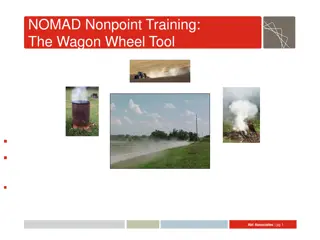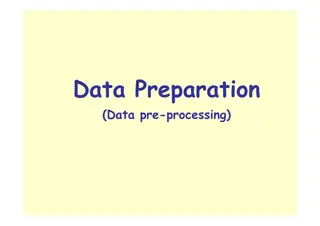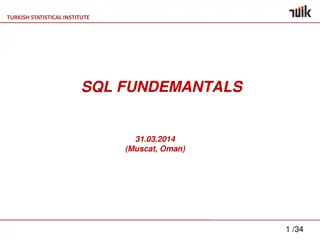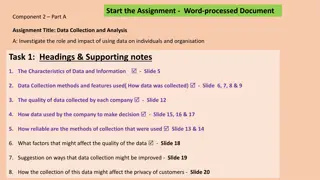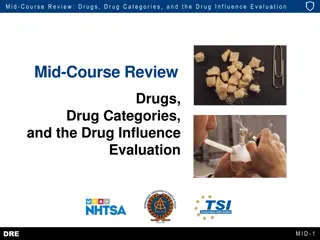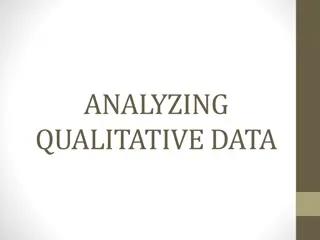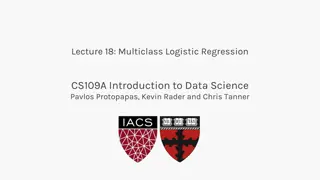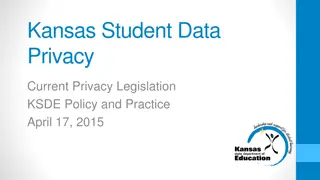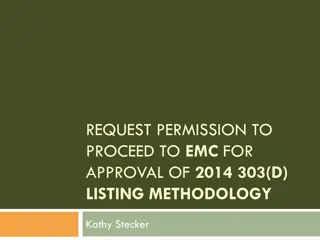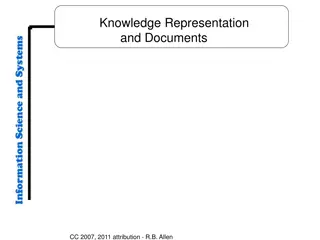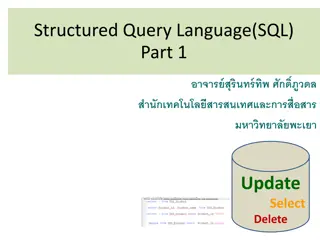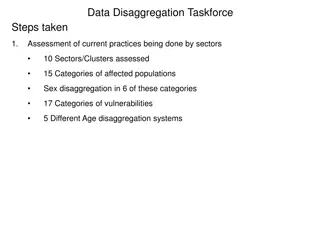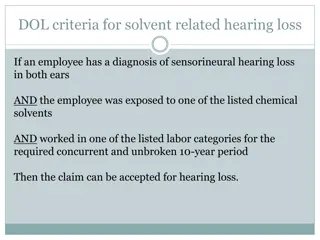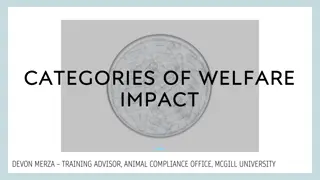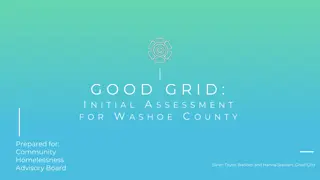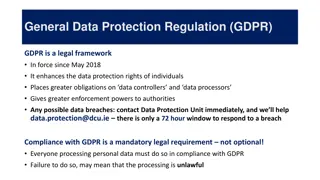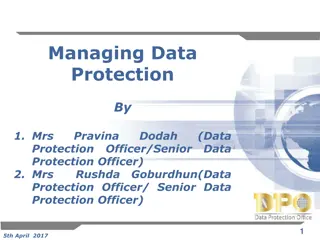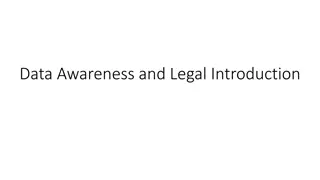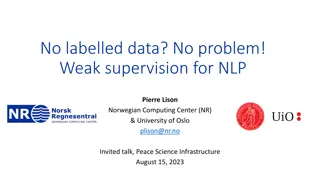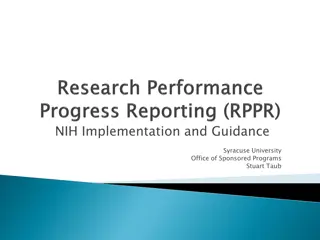The Digital Personal Data Protection Act 2023
The Digital Personal Data Protection Act of 2023 aims to regulate the processing of digital personal data while balancing individuals' right to data protection and lawful data processing. It covers various aspects such as obligations of data fiduciaries, rights of data principals, and the establishm
3 views • 28 slides
NCI Data Collections BARPA & BARRA2 Overview
NCI Data Collections BARPA & BARRA2 serve as critical enablers of big data science and analytics in Australia, offering a vast research collection of climate, weather, earth systems, environmental, satellite, and geophysics data. These collections include around 8PB of regional climate simulations a
6 views • 22 slides
Revolutionizing with NLP Based Data Pipeline Tool
The integration of NLP into data pipelines represents a paradigm shift in data engineering, offering companies a powerful tool to reinvent their data workflows and unlock the full potential of their data. By automating data processing tasks, handling diverse data sources, and fostering a data-driven
9 views • 2 slides
Revolutionizing with NLP Based Data Pipeline Tool
The integration of NLP into data pipelines represents a paradigm shift in data engineering, offering companies a powerful tool to reinvent their data workflows and unlock the full potential of their data. By automating data processing tasks, handling diverse data sources, and fostering a data-driven
7 views • 2 slides
Ask On Data for Efficient Data Wrangling in Data Engineering
In today's data-driven world, organizations rely on robust data engineering pipelines to collect, process, and analyze vast amounts of data efficiently. At the heart of these pipelines lies data wrangling, a critical process that involves cleaning, transforming, and preparing raw data for analysis.
2 views • 2 slides
Data Wrangling like Ask On Data Provides Accurate and Reliable Business Intelligence
In current data world, businesses thrive on their ability to harness and interpret vast amounts of data. This data, however, often comes in raw, unstructured forms, riddled with inconsistencies and errors. To transform this chaotic data into meaningful insights, organizations need robust data wrangl
0 views • 2 slides
Know Streamlining Data Migration with Ask On Data
In today's data-driven world, the ability to seamlessly migrate and manage data is essential for businesses striving to stay competitive and agile. Data migration, the process of transferring data from one system to another, can often be a daunting task fraught with challenges such as data loss, com
1 views • 2 slides
Exploring the History of Race Classification and Racial Categories
Delve into the historical context of race classification through the lens of notable figures like David Hume and Johann Friedrich Blumenbach. Uncover the evolution of racial categories in U.S. Census data, from 1850 to 1930. Reflect on the implications of these classifications in society and learn a
0 views • 19 slides
Qualitative Data Analysis Techniques in Research
The purpose of data analysis is to organize, structure, and derive meaning from research data. Qualitative analysis involves insight, creativity, and hard work. Researchers play a crucial role as instruments for data analysis, exploring and reflecting on interview discussions. Steps include transcri
1 views • 27 slides
Nonpoint Source Categories: The Wagon Wheel Tool Training Agenda
Delve into the comprehensive training agenda for the Wagon Wheel Tool focusing on nonpoint source categories. Explore options for submitting data to EPA, templates for inputting data, and interactive demonstrations. Understand the staggered development plan of different source categories and learn a
0 views • 16 slides
Understanding Data Governance and Data Analytics in Information Management
Data Governance and Data Analytics play crucial roles in transforming data into knowledge and insights for generating positive impacts on various operational systems. They help bring together disparate datasets to glean valuable insights and wisdom to drive informed decision-making. Managing data ma
0 views • 8 slides
Introduction to Multinomial Logistic Regression by Dr. Heini V. at University of Southampton
This content introduces Multinomial Logistic Regression, discussing categorical response variables, the basics of the model, interpretation of parameters, and an example study on economic activity and gender. It covers the extension of binary logistic regression to multiple categories, interpretatio
0 views • 16 slides
Understanding Alternative Investment Funds (AIFs) and Their Categories
Explore the world of Alternative Investment Funds (AIFs), including their introduction, categories, regulations, and taxation. Discover the benefits of AIFs, such as flexibility, diversification, and potential for higher returns. Learn about the entry of AIFs in the investment domain and the various
0 views • 30 slides
Introduction to Builders Law: Industry Context, Purpose, Administration, and Registration Categories
Over 600 companies in the Contractor Development Industry contribute significantly to the Cayman Islands' GDP. The Builders Law aims to protect consumers and businesses, enhance industry competency, and establish registration categories for different types of contractors. The Builders Board oversees
0 views • 15 slides
Importance of Data Preparation in Data Mining
Data preparation, also known as data pre-processing, is a crucial step in the data mining process. It involves transforming raw data into a clean, structured format that is optimal for analysis. Proper data preparation ensures that the data is accurate, complete, and free of errors, allowing mining
1 views • 37 slides
Turkish Statistical Institute SQL Fundamentals Overview
The Turkish Statistical Institute provides an in-depth look at SQL fundamentals covering main categories, basic SQL commands, set operations, aggregate functions, join operations, and more. SQL, or Structured Query Language, is a special-purpose programming language designed for managing data in RDB
0 views • 33 slides
Understanding Methodological Choice and Key Categories Analysis in Greenhouse Gas Inventory Management
Methodological choice and key categories analysis play a crucial role in managing uncertainties in greenhouse gas inventories. By prioritizing key categories and applying rigorous methods where necessary, countries can improve the accuracy and reliability of their emissions estimates. Key categories
0 views • 24 slides
Understanding Data Collection and Analysis for Businesses
Explore the impact and role of data utilization in organizations through the investigation of data collection methods, data quality, decision-making processes, reliability of collection methods, factors affecting data quality, and privacy considerations. Two scenarios are presented: data collection
1 views • 24 slides
Transformation of Quality Assessment Framework in Healthcare
The healthcare quality assessment framework is evolving with a new strategy focused on data-led, people's experiences, care integration, and safety culture. The current framework is transitioning towards a new approach by late 2023, incorporating separate registration and monitoring processes, five
0 views • 14 slides
Comprehensive Review of Drugs, Categories, and Drug Influence Evaluation
This mid-course review covers key aspects such as defining drugs, naming drug categories and subcategories, identifying drug categories for specific drugs, components of drug influence evaluation, and examinations conducted as part of the evaluation process. The content also includes identifying dru
0 views • 28 slides
Analyzing Qualitative Data: Steps and Coding Methods
Understanding qualitative data analysis involves several key steps, such as preparing the data through transcription, developing codes and categories using content analysis, revising categories based on the data, and reporting the analysis results. Content analysis helps in identifying words, themes
0 views • 32 slides
Understanding Multiclass Logistic Regression in Data Science
Multiclass logistic regression extends standard logistic regression to predict outcomes with more than two categories. It includes ordinal logistic regression for hierarchical categories and multinomial logistic regression for non-ordered categories. By fitting separate models for each category, suc
0 views • 23 slides
Kansas Student Data Privacy Legislation Overview
Kansas Student Data Privacy legislation, including the KS Student Data Privacy Act, emphasizes restrictions on disclosing student data and outlines permissible disclosures, enforcement measures, and reporting requirements. KSDE plays a key role in overseeing data management practices to ensure compl
0 views • 13 slides
Water Quality Assessment Process Summary for EMC Approval
The request seeks EMC approval for the 2014 303(d) listing methodology by Kathy Stecker. The process involves conducting reviews, public comments, and submitting lists for EPA approval. It includes assessment categories, response to comments, statistical confidence, and criteria exceedance. Changes
0 views • 11 slides
Understanding Knowledge Representation and Categories in Information Systems
Exploring various types of representations and categories, this content delves into Aristotle's classical view of categories, the contrast between Aristotle's empirical approach and Plato's Ideals, the concept of prototypes, and different models for categorization. It highlights how entities are cla
0 views • 21 slides
Understanding Reporting Requirements in Part C Exiting Data Collection
Explore the guidelines for reporting in the Part C Exiting Data Collection process, including who should be reported, how children in the Extended Part C Option are documented, and the eligibility criteria for different reporting categories. Learn about reporting by race/ethnicity, gender, and reaso
0 views • 11 slides
Comprehensive Overview of SQL: Commands and Categories
Explore the world of Structured Query Language (SQL) through this detailed guide covering SQL categories, command classifications (DDL, DML, DCL, TCL), data manipulation and control languages, and transaction control language. Learn about creating, altering, and dropping database objects, data retri
0 views • 14 slides
Data Disaggregation Taskforce: Assessment and Recommendations on Vulnerabilities
The Data Disaggregation Taskforce is conducting an assessment of current practices across sectors, assessing 10 sectors/clusters, 15 categories of affected populations, and identifying vulnerabilities in 17 categories. The Taskforce is working on harmonizing categories and finalizing recommendations
0 views • 6 slides
Criteria for Solvent-Related Hearing Loss and Compensation Claims
The Department of Labor (DOL) has specific criteria for accepting claims related to solvent-induced hearing loss in employees. If an employee has sensorineural hearing loss in both ears, was exposed to certain chemical solvents, and worked in particular job categories for a concurrent 10-year period
0 views • 8 slides
Prioritisation of Emerging Contaminants: NORMAN Approach Overview
The NORMAN approach aids in prioritising emerging contaminants by categorising substances into action categories based on knowledge gaps and then prioritising them for further action. Typical steps involve choosing candidate substances, relevant parameters, using prioritisation algorithms, and addre
0 views • 17 slides
Evolution of Welfare Impact Categories in Animal Research Guidelines
Canadian Council on Animal Care (CCAC) published updated guidelines titled "Categories of Welfare Impact" in 2024, replacing the Categories of Invasiveness. The new guidelines focus on animal experiences, procedures carried out on animals, and positive impacts on animal welfare. The categories (A-E)
0 views • 21 slides
Initial Assessment for Washoe County Homelessness Advisory Board
Initial assessment report prepared for the Community Homelessness Advisory Board of Washoe County. The report includes demographic data, universal intake form insights, evaluation matrix categories, and tools to track client progress in various assessment categories.
0 views • 7 slides
Understanding General Data Protection Regulation (GDPR)
GDPR is a legal framework implemented in May 2018 to enhance data protection rights and increase obligations for data controllers and processors. It requires compliance in processing personal data and imposes strict rules on handling data breaches. Key definitions, including personal data categories
0 views • 5 slides
Understanding Data Protection Regulations and Definitions
Learn about the roles of Data Protection Officers (DPOs), the Data Protection Act (DPA) of 2004, key elements of the act, definitions of personal data, examples of personal data categories, and sensitive personal data classifications. Explore how the DPO enforces privacy rights and safeguards person
0 views • 33 slides
Understanding Data Awareness and Legal Considerations
This module delves into various types of data, the sensitivity of different data types, data access, legal aspects, and data classification. Explore aggregate data, microdata, methods of data collection, identifiable, pseudonymised, and anonymised data. Learn to differentiate between individual heal
0 views • 13 slides
Detailed Pricing Information for 2019-20 Season Tickets and Game Tickets
In the 2019-20 season, detailed pricing information is provided for MRSC Membership, European Cup Tickets, Thomond Park PRO14 Prices, Irish Independent PRO14 Prices, and Junior Season Ticket Prices. The data includes various membership levels, payment options, game prices, and discount details for d
0 views • 7 slides
Understanding Syntax and Lexical Categories in English Grammar
Syntax is the study of rules in generating grammatical sentences, focusing on building grammars that produce well-formed English sentences. It involves organizing words into categories like nouns, verbs, adjectives, and adverbs to form phrases and clauses. Lexical categories are determined based on
0 views • 33 slides
Weak Supervision for NLP: Overcoming Labelled Data Challenges
Addressing the challenge of acquiring labelled data for NLP models, weak supervision techniques offer solutions through alternative annotation methods and leveraging diverse data sources. This talk highlights the importance of overcoming the scarcity of labelled data in machine learning and NLP task
0 views • 18 slides
ETSU Employee Climate 2014-2015 Chronicle's Great Colleges to Work For Overview
Survey data from 2014-2015 highlights improvements needed in employee response rates for validity. Categories include job satisfaction, teaching environment, professional development, and compensation. Ratings scale from poor to excellent. The survey involved 600 employees across different categorie
0 views • 23 slides
Streamlining Research Progress Reporting for NIH Awards
Research Performance Progress Report (RPPR) is a standardized mechanism to facilitate interim progress reporting for NIH-funded projects, aiming to enhance consistency and minimize administrative burdens. It replaces the eSNAP process for certain types of awards and fellowship grants. RPPR includes
0 views • 12 slides


